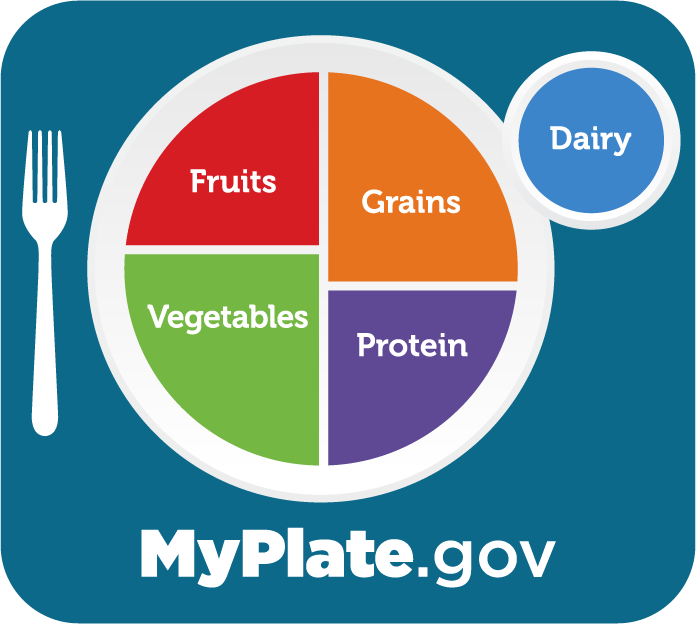
Dining Hall Decisions
— By Jilleon Farrell, Dietetic Intern, University of Maine and Kate Yerxa, MS, RD, Extension Professor University of Maine Cooperative Extension
In addition to being an opportunity for new adventures, adjusting to college life can be stressful, intimidating, and challenging. Dining halls promote an all-you-can-eat style which provides an abundance of choices for students to choose from when creating their meals. The new meal environment can be overwhelming for students and may cause some to choose more food than they actually want or need, leading to overeating and food waste. Below are a few tips for creating a healthy relationship between you and the dining hall to promote healthy eating.
 Try using MyPlate as a guide: When adding food to your plate, imagine that your plate is split into four sections – each taking up about one-quarter of your plate.
Try using MyPlate as a guide: When adding food to your plate, imagine that your plate is split into four sections – each taking up about one-quarter of your plate.
- Protein: Try opting for lean protein options such as boneless, skinless chicken or ground turkey. Other lean sources of protein include; dried beans, peas, and lentils, tofu, and eggs.
- Grains: Choose whole grain options whenever possible such as whole wheat bread, brown rice, whole wheat pasta, oatmeal, and quinoa. Fun fact: popcorn is a whole grain!
- Fruit: Try adding fruit to your meal such as an apple or fruit salad, or add dried fruit to oatmeal or cereal.
- Vegetables: Choose vegetables from the salad bar or look for meal options that have a variety of vegetables like stir-fried and grain bowls.
- Rethink Your Drink:
- Hydration is extremely important in helping our brains function properly to improve mood, sleep quality, and cognitive function.
- Juice drinks, sodas, and energy drinks are all high in added sugar and calories.
- For a healthier choice, opt for water, non-fat or 1% milk, or 100% fruit juice with no added sugar.
- Keep healthy food choices in your dorm room to prevent over consumption of fast food or junk food.
- Dining halls are not open 24/7 and our bodies’ hunger cues do not only surface during ‘open hours’.
- By keeping healthy snacks on hand, you can ensure that you will have a nutritious and sustaining snack whenever you want or need it. A few ideas include single servings of applesauce, fruit cups in their own juice, nut butters to eat with bananas, apples, whole wheat crackers, and granola bars.
- The main focus of maintaining a healthy diet at a dining hall is to focus on balance and mindful eating.
- Be aware of your internal hunger cues to ensure that you are eating when you are hungry and stopping before you are too full. The goal is to maintain between being ‘hungry, stomach growling’ and being ‘full, but not uncomfortable’ on a hunger fullness scale to promote our best selves academically, emotionally, and physically.
